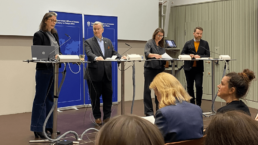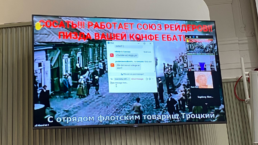On Tuesday April 5, The Case for Her attended UNFPA’s hybrid presentation of their “State of the World Population 2022” report. The presentation featured an overview of the report with a panel discussion with representatives from the Sexual and Reproductive Health and Rights (SRHR) field: UNFPA Regional Director for Asia and the Pacific, Björn Andersson; State Secretary at the Swedish Ministry of Foreign Affairs, Jenny Ohlsson; and Chairman of RFSU Hans Linde.

The report discusses how women’s and girls’ agency and ability to make choices related to their reproductive health are heavily undermined due to factors like stigma, socioeconomic status, and gender disparity among many others. The reported findings can have a significant impact contributing to deepening our understanding of what successful interventions enabling girls and women globally to acquire agency within SRHR look like.
Pleasure is the primary driver for having sex. If we normalize women’s possibility and desire to have pleasure and autonomy in their sexuality there can be a social shift in people’s attitudes toward contraceptives and safe abortions globally. As advocates for the inclusion of pleasure in discussions about sexual and reproductive health, we questioned the speakers’ views on the matter, since it wasn’t mentioned in the report. What happened next stunned the whole room: a troll took over the zoom call and entire conversation with a black and white video covered in red text while blasting loud music and spamming the chat with nonsense. Unfortunately, we were reminded that the idea of women accessing pleasure, SRHR and safe abortion is still radical and conversations such as this one are always at risk of unsavory disruptions.

After what felt like hour-long minutes, the sound was turned off, we were able to ask our questions and the panel gave their positively astonishing response:
Björn Andersson, UNFPA:
“Pleasure is central, but it has to be done right. When you talk about pleasure you need to be mindful of who you are talking to. We have to have a strategy when we work with governmental groups and organizations. The first thing you say will not be “sex equals pleasure” but you need to find a way to weave it into the conversation. Thankfully, some organizations and groups are much more open to discussing these issues. Going forward we have to use alternative approaches to incorporate pleasure into the SRHR conversation since that’s what it’s all about. That’s why there are so many rules about women’s sexuality in particular”.
Hans Linde, RFSU:
“Talking about pleasure will be fundamental to the relevance of sex education. If we only refer to sexuality and relationships as something dangerous, we will leave a lot of young people alone, feeling isolated with questions about their needs. This is the case in Sweden and internationally.
RFSU sees this among our partners and we see it in our experience working with sex education in Sweden. Young people are asking: “how can I make a relationship work?”; “ How do I know that the person I like, likes me back?”; “How do I know that the person I have sex with enjoys it and feels pleasure?” Including pleasure in the conversation is crucial.
I also think that a lot of the norms we’re discussing here are the same norms that are linked to women’s bodies, women’s sexuality, women’s pleasure, and where there is a great need for change – to ensure that women and girls have the agency to decide over their bodies and sexuality, that you have both the power to say no, but also have the freedom to say yes when you want to have sex.”
It is clear that UNFPA and RFSU are role models for approaching sexual health interventions in a pleasure forward and rights-based way. We are hopeful conversations like these encourage others in the sector to follow suit and join us in prioritizing pleasure!
- The Case for Her Teamhttps://thecaseforher.com/blog/author/tcfh-team/
- The Case for Her Teamhttps://thecaseforher.com/blog/author/tcfh-team/
- The Case for Her Teamhttps://thecaseforher.com/blog/author/tcfh-team/
- The Case for Her Teamhttps://thecaseforher.com/blog/author/tcfh-team/


